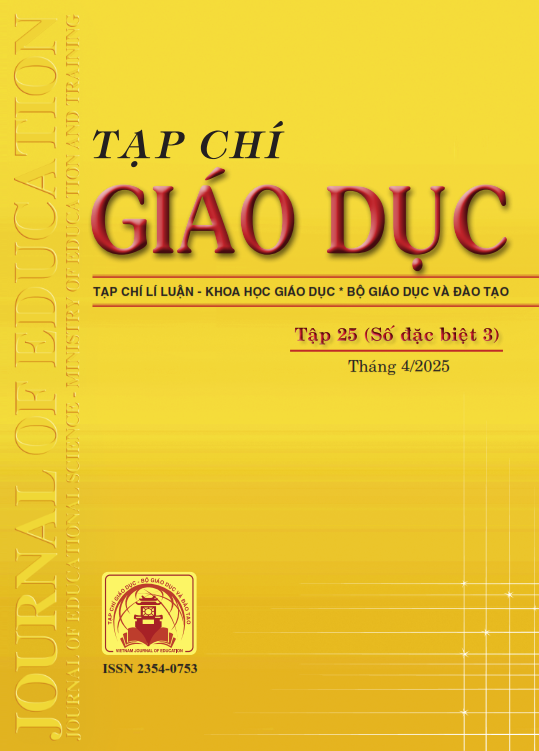Khám phá một số yếu tố tác động đến kĩ năng hợp tác của sinh viên theo tiếp cận kĩ năng của thế kỉ XXI
Tóm tắt
In the 21st century, collaboration skill is important and necessary for workers. The development of collaboration skill as well as 21st century approach collaboration skill has always been of interest to educators and trainers at all levels of education. Despite the development efforts, it seems that 21st century approach collaboration skill has not yet reached a good level, so it is still in need of improvement. The results from the exploration of 519 valid responses from first and second-year students at Ho Chi Minh City University of Technology and Education (HCMUTE) revealed that five experiential activities: teamwork, participation in student unions/clubs, scientific research, part-time work, and doing housework, showed significant differences and correlations at the 5% significance level with the 21st collaborative skill. However, only four of them, excluding part-time work, were suitable in the regression model and explained 21.5% of the impact on the 21st collaborative skill. Additionally, the results indicated that students’ 21st collaborative skill was at a fairly good level and did not differ significantly at the 5% level based on some variables such as gender, regular living place before university, type of high school attended, but there were significant differences with average academic results in certain years. Based on these findings, it can be inferred that students’ 21st collaborative skill can be developed not only through academic activities but also through teamwork in any situation, participation in student unions/clubs, scientific research, and doing housework.
Tài liệu tham khảo
Ananiadou, K., & Claro, M. (2009). 21st Century Skills and Competences for New Millennium Learners in OECD Countries. OECD Education Working Papers, No. 41, OECD Publishing. https://doi.org/10.1787/218525261154
Belsley, D. (1991). Conditioning diagnostics: Collinearity and weak data in regression. John Wiley & Sons, Inc.
Boyraz, S. (2021). A scale development study for one of the 21st century skills: Collaboration at secondary schools. African Educational Research Journal, 9(4), 907-913. https://doi.org/10.30918/AERJ.94.21.129
Chalkiadaki, A. (2018). A systematic literature review of 21st Century Skills and competencies in primary education. International Journal of Instruction, 11(3), 1-16. https://doi.org/10.12973/iji.2018.1131a
Cohen, J. (1988). Statistical power analysis for the behavioral sciences (2nd ed.). Lawrence Erlbaum.
De Prada Creo, E., Mareque, M., & Portela-Pino, I. (2020). The acquisition of teamwork skills in university students through extra-curricular activities. Education + Training, 63(2), 165-181. https://doi.org/10.1108/et-07-2020-0185
De Prada, E., Mareque, M., & Pino-Juste, M. (2022). Teamwork skills in higher education: is university training contributing to their mastery? Psicologia Reflexão E Crítica, 35(1). https://doi.org/10.1186/s41155-022-00207-1
Đặng Thị Diệu Hiền (2022). Tổng quan về kĩ năng và năng lực của thế kỉ XXI và so sánh với yêu cầu năng lực trong chương trình giáo dục phổ thông - Chương trình tổng thể tại Việt Nam. Tạp chí Khoa học, Trường Đại học Sư phạm Hà Nội, 67(5), 61-73. https://doi.org/10.18173/2354-1075.2022-0164
Đặng Thị Diệu Hiền, Dương Thị Kim Oanh, Nguyễn Văn Long Giang (2023). Phát triển thang đo kĩ năng hợp tác của sinh viên theo tiếp cận kĩ năng của thế kỉ XXI. Tạp chí Khoa học, Trường Đại học Sư phạm Hà Nội, 68(1), 44-59. https://doi.org/10.18173/2354-1075.2023-0005
Hopkins, W. G. (2000). A new view of statistics. Internet Society for Sport Science. http://www.sportsci.org/resource/ stats
Koehorst, M. M., van Deursen, A. J. A. M., van Dijk, J. A. G. M., & de Haan, J. (2021). A Systematic Literature Review of Organizational Factors Influencing 21st-Century Skills. Sage Open, 11(4). https://doi.org/10.1177/ 21582440211067251
Lemke, C. (2002). EnGauge 21st Century Skills: Literacies for a Digital Age. North Central Regional Educational Laboratory and the Metiri Group.
Leow, F. T., & Neo, M. (2023). Critical Factors for Enhancing Students’ Collaborative Learning Experiences in a Project-based Connectivism Learning Environment. International Journal of Learning, Teaching and Educational Research, 22(7), 388-410. https://doi.org/10.26803/ijlter.22.7.21
Liu, Y.-H., Kwon, K., & Johnson, L. P. (2018). Exploration of Factors in the Early Collaboration Phase Affecting Virtual Groups’ Overall Collaborative Learning Experiences. Journal of Educational Computing Research, 56(4), 485-512. https://doi.org/10.1177/0735633117715034
OECD (2005). The definition and selection of key competencies: Executive summary. https://one.oecd.org/ document/EDU/EDPC/ECEC/RD(2010)26/en/pdf
Partnership for 21st Century Skills (2009). A Framework for Twenty-First Century Learning. http://www.p21.org
Qiao, Y. (2011). Interstate Fiscal Disparities in America: A Study of Trends and Causes (2th ed.). Routledge.
Qureshi, M. A., Khaskheli, A. A., Qureshi, J. A., Raza, S. A., & Yousufi, S. Q. (2021). Factors affecting students’ learning performance through collaborative learning and engagement. Interactive Learning Environments, 31(4), 2371-2391. https://doi.org/10.1080/10494820.2021.1884886
Tạ Nhật Ánh (2018). Kĩ năng hợp tác trong học nhóm của sinh viên. Luận án tiến sĩ Tâm lí học, Viện Hàn lâm Khoa học Xã hội Việt Nam.
Underwood, J., & Underwood, G. (1999). Task effects on cooperative and collaborative learning with computers. In K. Littleton & P. Light (Eds.), Learning with computers: Analysing productive interaction (pp. 10-23). Routledge.
Yamane, T. (1967). Statistics: An Introductory Analysis (2nd Edition). Harper and Row.
Yuen, A. H. K., Lee, M. W., Law, N., & Chan, A. (2008). Factors Predicting Impact of ICT-Use on Students: An Exploration of Teachers’ Perceptions. The Proceedings of IRC 2008.
Đã Xuất bản
Cách trích dẫn
Số
Chuyên mục
Giấy phép

Tác phẩm này được cấp phép theo Ghi nhận tác giả của Creative Commons Giấy phép quốc tế 4.0 .












